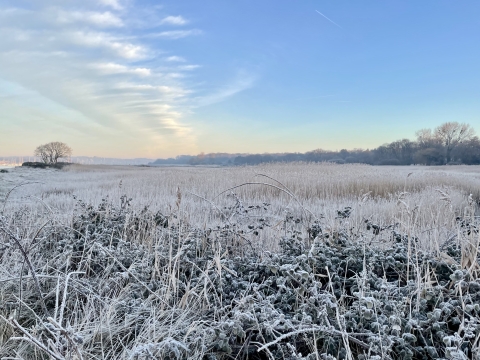

Research has shown that taking breaks can have a positive impact on wellbeing and productivity.
4 minutes
With the upcoming Christmas break, and the closure of many areas of the University during this time, I wanted to make sure we shared the University opening times with you, and provide some tips for taking your own break.
Most University offices are closed from 4pm on Friday 19 December 2025 until Monday 5 January 2026. Find information from the University about urgent support.
You may decide to take a break from your research studies over the Christmas break; taking some time off allows your brain and body some time to recuperate, and you may find when you return to your research or studies, you are in a better position to focus on them.
“Micro-breaks, lunchtime breaks and longer breaks, have all been shown to have a positive relationship with wellbeing and productivity.” (The Wellbeing Thesis).
It can be difficult to take time off from your research. You may feel that you don’t have time to take a break, or when you do take a break, you feel guilty for not working. As a part-time research student, I often feel that I am not dedicating enough time to the reading and writing I need to undertake. However, research has shown that taking breaks can have a positive impact on wellbeing and productivity, so I wanted to share some tips that might help you when planning for and taking breaks:
- Plan when you are going to take breaks, and stick to it. Add your breaks to your calendar or schedule and let your supervisors and colleagues know when you are going to take longer breaks - this will allow you to be organised for any deadlines or other activities that might be time-sensitive.
- Notice how you feel when you are taking a break. Pay particular attention to any positive feelings or benefits you experience. Remembering these can help motivate you to take breaks in the future. If you find you are constantly thinking about your work when on a break, try to bring your focus back to the activity you are doing, or choose an activity that requires some concentration. I try to dedicate some time during my breaks to playing computer and board games as these require my complete focus.
- Techniques such as the Pomodoro Technique, where you work for 25 minutes and take short breaks in between, can help you work more efficiently and ensure you take regular breaks whilst working. There are apps that you can use too, such as the Be Focused – Pomodoro Timer app for Apple devices, or the Focus To-Do: Pomodoro Timer & To Do List Chrome extension.
- Create a list of things you need to do, and prioritise what needs to be done before your break, and what can wait. The Eisenhower Matrix can help you to prioritise your to-do list.
- If you can (and want to), plan activities for your breaks, such as going for a walk or meeting friends or colleagues for lunch/coffee. I live close to the River Hamble, and plan an early morning walk once a week, often with my camera in hand. I have noticed that these walks really help to clear my mind, and provide me with the focus and energy I need to concentrate on my (ever increasing) reading list!
- It’s OK to do nothing when taking a break. Your breaks should be spent how you want, there is no right or wrong.

Emma's River Hamble walk.
Photo credit - Emma Cripps.
If you are in Portsmouth over the break, there are lots of green spaces to explore, and Ravelin Sports Centre will be open on most days during the break. If you haven't already, the PGR Society is free to join at any time - created and coordinated by research students, the society aims to bring together research students from all walks of life.
If you have any concerns before, or during the upcoming break, there are many sources of support available to you. Organisations such as the Samaritans offer 24-hour services, or text "SHOUT" to 85258 to contact the Shout Crisis Text Line. In the event that you need support urgently, the University has a list of helplines and other support.
You can also find resources from the Wellbeing Thesis, an online wellbeing, learning and research resource for postgraduate research students, and the University provides confidential support and advice through Student Wellbeing.
Myself and the rest of the Doctoral College team hope that you are able to plan some time-off, and enjoy some rest over the break.
Emma
Emma Cripps is Researcher Developer in the Doctoral College and is also undertaking a Professional Doctorate in Education.
Contact us
You can contact the Doctoral College via email at doctoral-college@port.ac.uk. Any emails received after Friday 19 December 2025 will be looked at when the University opens again on Monday 5 January 2026.
Enable University alerts
Turn on notifications for critical updates like closures, safety alerts, and urgent service disruptions.





